Genre: Sports Developer: Victordean/Millennium Publisher: Electronic Arts Players: 1-4 Released: 1992
With moderate success of the James Pond series, his first and only spin-off came into the world in Europe in ’92, to coincide with the summer Olympics, and then be released in ’93 in the U.S. Unfortunately for the oceans greatest hero, America wasn’t ready for a cartoon-themed sports game. Even for the few that decided to give it a shot, whether they bought it or rented it, were disappointed. While the presentation wasn’t bad, the games itself ranged from somewhat challenging to “what the hell am I supposed to do?” and “how is this an Olympic sport?”
But like I’ve said before regarding this character, At least Millennium tried. A few of the games can actually be fun once you figure out how they work (read the instruction book, it’s basically required). The characters, while a tad generic, are presentable and show that this was a true effort.
The music is a mix of some classical music synthesized, and some catchy in-game tunes. While not great, they’re not all bad either. Regardless, you probably won’t really notice after a few minutes though. Any other sounds the game has to offer are nothing special either. This isn’t the main part of the game anyway, so it can get away with it easier.
The graphics are your normal James Pond cartoonish fair, but large compared to the normal James Pond games. Everything is easy to decipher, if not kind of darker in shade. The animations are fluid even with the repetitiveness of the games. Still, for a game released in ’92, they still feel kind of dated. It hasn’t age well, is the basic point I’m trying to make here.
When we get down to it, the actual gameplay is what’s most important. Plenty of the games require button mashing, while others are modified Tapper clones (keep up with certain items before one goes too far). Here’s a quick analysis of the games available:
100 Meter Splash: Simple dash game. Just repeatedly mash A + B to get going. This can actually get frustrating in the beginning, but soon you’ll win this one easily. Obviously a simple game to start you off.
Kipper Watching: I don’t really understand why this is considered an Olympic sport. You play a seal that needs to knock beach balls away from other seals sleeping. That’s it. This will look and sound easy in the beginning, but you’ll soon be annoyed by how so many balls fly into the screen, making the game almost impossible.
The Bouncy Castle: Another simple game. Jump on either sponge on the ground and keep jumping and doing tricks. This becomes a game of timing, since you’ll need to figure out when exactly to do all the combos (which you won’t know unless you read the book). This can become somewhat hard to figure out but easy to eventually master.
Feeding Time: Again, WHAT THE HELL!? How is this an Olympic sport? A tapper-like game where all you do is control a little starfish running around a dock. As your running, you’ll be dropping food along to feed fish. Yeah. If you don’t do it fast enough, fish hooks drop down and start to steal away the fish. So for 3-4 minutes, you just drop doughnuts to the fish below. The tediousness obviously hits you quickly here.
Shell Shooting: One of the more creative games here, although not really an Olympic “sport” to say, but this can actually be pretty fun. Run back and forth, jumping on the little shell creatures who will bounce around. Jump on them right to catch them and — you got it — shoot them to the balloons above. While it seems simple enough, this can actually get challenging when little spikers start crawling out, or when the green jumpers can throw off your timing. One of the game’s better efforts.
Tour De Grass: One of the reasons that the instruction book is needed. In the beginning, it seems all you do is jump around and try to land right to use the momentum of the hills. Not until I read the book later did I even think of using the D-pad to turn your little unicycle around. An actually fun one here, as you’ll need to have that right balance of speed and jump timing to finish the course in time. One of the more challenging ones due to a sometimes unfair time limit.
Hop, Skip, and Jump: Better known as “How to break a controller.” While a nice idea on paper, its actual execution is somewhat lacking. Run quickly to the mark, but not too fast. If you miss the jump mark, you lose… a big IF there. Then when you actually get to the final jump, you’ll get a jump meter. Of course, if you haven’t read the book (or didn’t have one, like me) you’d think that filling up the bar the whole way would obviously bring in a higher and farther jump. Instead you lose. When you realize that a forty-five degree angle is key, you’ll be frustrated again by constantly missing the mark because sometimes that meter is just impossible to stop at the right point. Again, practice makes perfect.
Leap Frog: Not the money-making children’s computer series. Instead it’s another running game, instead this time you need to really pay attention to the ground, because those giant smiling eels will really slow a frog down. Other than that, this isn’t a real hard one. Timing is key here.
Not much else to say. It’s a multi-game and looked good in theory, but with an unbalance of games quality and difficulty, it becomes like any other Olympic video game, sub-par.
SCORE: 5 out of 10

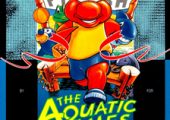
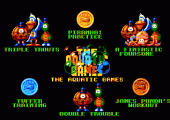
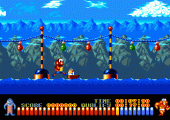
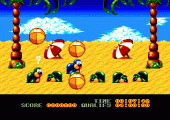
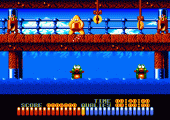
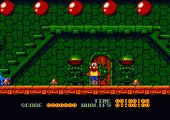
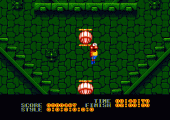
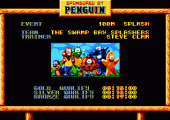
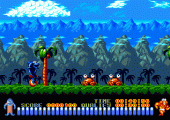
Not essential for James Pond popularity after th really good second episode of EA’s plateformer, this Olympic fest of absurdity does held his promises: 5 minutes of fun and then, infinite emptiness. CONCLUSION:4/10